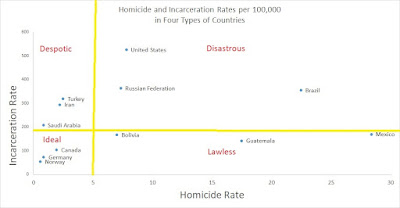Last week, the 8th Circuit decided Molina v. City of St. Louis, granting qualified immunity to police officers who shot tear gas at a group of lawyers (wearing bright green hats saying "legal observer") congregating on their own property while observing protests. The lawyers contended that the police gassed them in retaliation for exercising their First Amendment right to observe the protests. In a 2-1 ruling authored by Judge Stras, the court held that it was not "clearly established" in 2015 that there was any First Amendment right to observe protests.
(Because this is the Eighth Circuit, this is not even the most outrageous qualified immunity decision authored by Judge Stras of its week. That honor has to go to Leonard v. St. Charles County Police Department, where a jailhouse nurse simply refused to give a mentally ill inmate his prescribed medication, instead placing him under suicide observation -- the end result being jail staff "observing" the man claw out his own eyeball. Is just refusing to provide prescribed medical care "deliberate indifference" to the inmate's constitutional rights? Of course not! After all, the nurse did not do nothing -- she placed the man on suicide watch! That's what's great about modern medicine: everyone knows it can be freely swapped out with "do nothing but observe the patient" with no material change in outcome. This is why nursing is such an easy and non-stressful occupational path).
The interesting thing about Molina is that the Eighth Circuit had already in prior cases appeared to recognize that there was a constitutional right to observe the police. And under the "prior panel" rule, those decisions are supposed to be precedentially binding. But the Molina panel argued that those cases only concluded that it was a Fourth Amendment violation to seize someone for observing police (since there's no probable cause to believe any crime was committed). This does not establish, in the court's view (and notwithstanding the broad language in the case stating that there is a "clearly established right to watch police-citizen interactions at a distance and without interfering."), that there is a First Amendment right that's been established.
Judge Benton's dissent makes mincemeat of this finely-parsed distinction. But I wanted to flag a particular passage from Judge Stras' opinion that appears to embody a sort of vulgar textualism that's way too clever for its own good. In a footnote, Judge Stras argues:
It is not beyond the realm of possibility that a First Amendment right to observe police exists, but our Fourth Amendment cases like Walker and Chestnut do not clearly establish it. And it makes good sense why. It is one thing to conclude that officers cannot arrest someone passively standing by and watching as they do their job. After all, in the absence of interference, there is no crime in it. But it is another matter to say that watching is itself expressive. Expressive of what? Not even Molina and Vogel can provide a clear answer.
This, to me, seems to prove way too much, seduced by the allure of a hyper-literal reading of "expression". This argument, after all, would suggest that there is no First Amendment interest in reading a newspaper or watching a television program. Certainly, the speaker is expressing something, but what is the reader or watcher expressing? For them too, we could ask "expressive of what?" One can shoehorn in an answer ("they're expressing interest in or approval of the material"), but the more obvious answer is that the First Amendment encompasses interests on both the side of the speaker and the listener, and it is a fluke of grammar that "expressive" only directly captures the former. It seems obvious to me that the First Amendment encompasses some sort of right to take in information, not just to transmit it, and any reading that denies the former under the guise of interpreting the word "expression" is completely misunderstanding how to do legal analysis.
Incidentally, many years ago there was a similar thing with Justice Thomas in his Lopez concurrence, where he tried to bring constitutional Commerce Clause jurisprudence all the way back to E.C. Knight and claim that manufacturing is not "commerce". Among his arguments was the point that, grammatically speaking, you can't really substitute "manufacturing" for "commerce" in the clause -- while one can engage in "commerce" with a foreign nation, one can't really engage in "manufacturing" with a foreign nation. This was an argument that, again, proved too much. If there was a constitutional clause authorizing Congress to "wage war with a foreign power", would the power to "wage war" permit Congress to authorize the construction of warships? As a matter of grammatical substitution, it doesn't work ("construct warships with a foreign power"?). But all that means is the broader phenomenon of "waging war" can include activities which are not grammatically interchangeable with the phrase "wage war". And so too with "commerce", which also can refer to a range of activities which, taken as a whole, operate upon or in relation with foreign nations, Indian tribes, or the several states.
It is not a good thing, but also perhaps not an accidental thing, that the turn towards hyper-textualism corresponds to judges becoming increasingly bad readers of texts. The First Amendment obviously encompasses activities that are about receiving information alongside transmitting them. Pilpul about "expression" doesn't change that.

